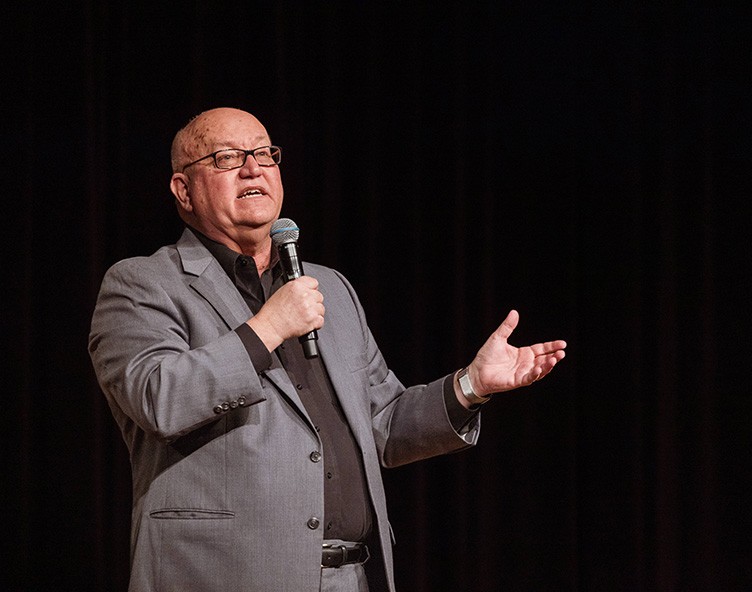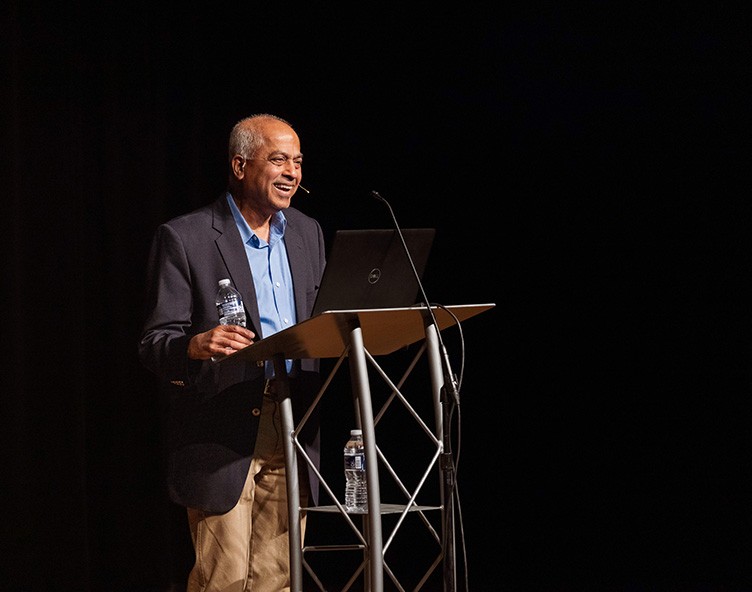College of Business and Entrepreneurship Hosts Faith at Work Business Symposium
Posted on: May 9, 2023
An FBI informant’s role in exposing an international price fixing scheme, and a businessman’s work which led to the end of slavery in Nepal highlighted North Greenville University’s Faith at Work Business Symposium in the spring of 2023. Students and guests from across the area gathered in Tigerville for the symposium which focused on Ministry in the Marketplace.
The event featured presentations from Mark Whitacre, Vice President of Culture and Care at Coca-Cola Consolidated and Executive Director of the company’s t-factor program; and Marian Noronha, President and Founder of TURBOCAM International.
“This symposium is designed to give students an idea of how faith and work intersect,” said NGU’s College of Business and Entrepreneurship Dean Dr. John Duncan. “We believe that God intended for us to do business from the foundation of the world. God created us all with different talents and different abilities, and we need each other to be able to work together.”
 Mark Whitacre
Mark Whitacre
VP of Culture and Care at Coca-Cola Consolidated
Whitacre’s background in business is quite literally Hollywood material. Famous for being the highest-ranked executive of any Fortune 500 company to become a whistleblower, Whitacre helped the FBI uncover one of the largest price fixing cases in U.S. history. These events in the early 1990s were the basis for the 2009 film, The Informant!, which starred Matt Damon as Whitacre.
“I don’t how many of you have gone and told the FBI you’re stealing a billion dollars a year, but I can tell you it’s an interesting reaction,” Whitacre told the crowd at NGU’s Turner Chapel on April 10. “That phone reached Janet Reno, the Attorney General. It reached William Sessions, the Director of the FBI. It became the largest price fixing case in US history.”
Achieving success early in his career, Whitacre was hired by Archer Daniels Midland (ADM) in 1989, becoming the company’s youngest Divisional President at the age of 32. A short time later, Whitacre became a Corporate Vice President at ADM at the age of 35 and was in line to become the company’s president.
“Boy, did I get obsessed to that lifestyle. I would be getting stock options and bonuses totaling two or three million a year. I had a corporate jet,” he said. “What does a 32-year-old do with an eight-car garage? You fill it up. I had a Ferrari, two BMWs, two Mercedes. There was nothing that could fill the void in my heart. I thought money was going to fill it, but it never did.”
Whitacre’s rapid ascent up the corporate ranks landed him in a precarious position when he learned that the company had been making a large percentage of its revenue from a price fixing scheme. Unsure of how to proceed, Whitacre told his wife, who encouraged him to go to the FBI. Over the next three years, Whitacre wore a wire to help the FBI with its investigation.
During the course of the investigation, authorities learned of Whitacre’s own fraud and tax evasion, and he was eventually sentenced to eight and half years in prison.
“I was my own worst enemy every step of the way,” he said. “This is not an example of faith at work. This is an example of what happens when you don’t bring your faith to work. I made the biggest mistakes of my life. I should’ve left that company as soon as I found out about the price fixing instead of getting the bonuses and staying involved with it. I sold my soul the day I got involved with that case in the first place.”
Facing a lengthy prison sentence, Whitacre – who earned a Ph.D. degree in biochemistry from Cornell University — began to consider his faith, which he said he had largely rejected while a college student. After reading books by scientists who were professing Christians and having discussions with noted prison ministry leader Chuck Colson, he became a Christian and spent the majority of the next decade working to give back.
“Helping others—even in federal prison—those were some of the most rewarding years of my life,” he said.
Upon his release, Whitacre vowed to use his time and skills to bring his faith to work.
“God gave me a second chance,” Whitacre said. “For 20 years now, I’ve been working in a faith-at-work environment, and there’s no better place.”
“Living a life of significance is so much more important than the way the world defines success. Your life will be so much more fulfilling if you honor God with everything you say and do,” he said.
 Marian Noronha
Marian Noronha
President and Founder of TURBOCAM International
Marian Noronha, founder of TURBOCAM International, shared his personal journey during the symposium, which including launching the aerospace and turbomachinery manufacturing company based in New Hampshire. Noronha has spent his career living out his faith through his business.
Noronha became a Christian after getting involved with a church in his 20s.
“I decided I was one of the smartest people in the world, but I also figured out I was one of the most miserable people in the world and I didn’t know what to do about that,” he said.
“For three months, I went to church. I got invited to home groups. I even went to 6 a.m. prayer meetings on Fridays,” Noronha said.
After becoming a believer, Noronha continued to meet with a group from his church and expressed desires to create a mission-minded business.
“We were talking about sending people around the world for missions, but how are we going to raise money for the poor or train people for jobs?” he asked.
Using his skills, Noronha founded TURBOCAM, which has manufacturing operations in the US, the UK, Romania, and India, and sales offices in the Netherlands.
He led the company from a start-up in 1985 to 1,000 employees worldwide, and sales in the $150-200 million range.
“Some people think I have a brilliant international business plan, but it comes down to this: where is there a confluence of a market and Christians who need jobs? If I can put the two together, then we can build something.”
In 1999-2000, Noronha redeemed 42 slave families in Nepal – by paying their debts to the slaveholders — and established villages for their settlement. His efforts helped spark the abolishment of slavery in Nepal in 2000. After abolition, Noronha continued to work with Nepali churches to establish and support six schools that educate more than 1,100 children.
“The mission is not money. This mission is the people,” he said. “The creativity and ability to do something well with the work of our hands, that’s the value of the company. The other stuff we get to accomplish is the icing on the cake.”
NGU President Dr. Gene C. Fant, Jr. encouraged business students in attendance to value mission over success.
“The culture of a business impacts everything from the bottom line to its reputation,” President Fant said. “Here at North Greenville, we’re about equipping transformational leaders for church and society, which is one of the reasons why we’re really prioritizing resources for the College of Business and Entrepreneurship. We believe we have students here that can go impact the culture by becoming leaders in business.”
“The business world and faith are not at odds with each other,” he said. “They don’t just merely overlap with each other. They are vitally connected to one another because of the way God has designed the world and created us.”
About North Greenville University
NGU offers more than 125 areas of study across certificate, bachelor’s, master’s, doctoral, and early college opportunities. Online. In-person. At our main campus in Tigerville, SC, the Tim Brashier Campus in Greer, SC, or several educational centers around the U.S. One university, many locations. Every day. Epic. To learn more, visit ngu.edu.




